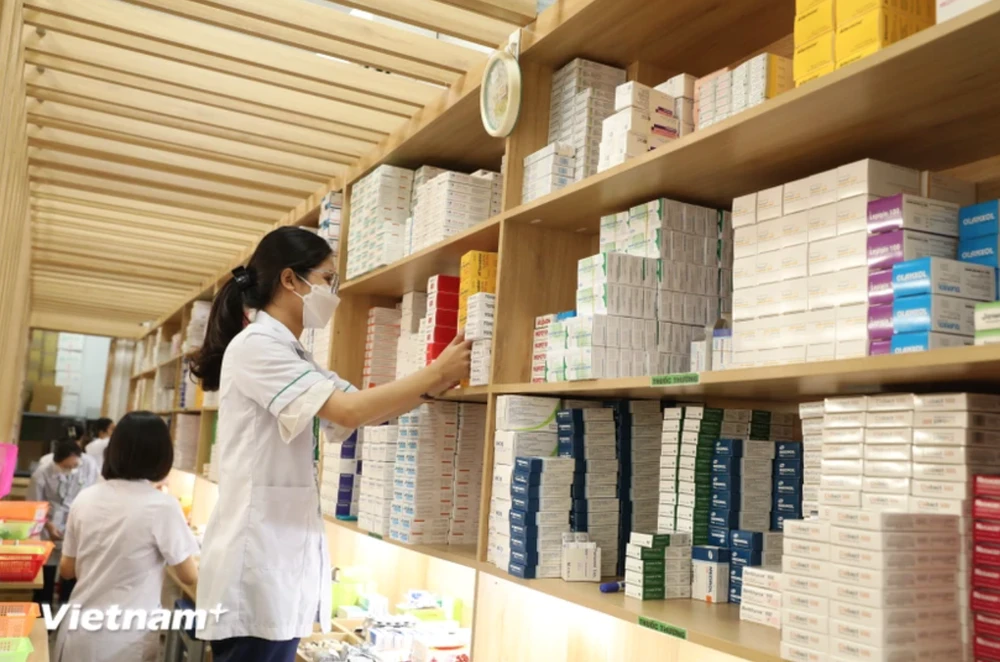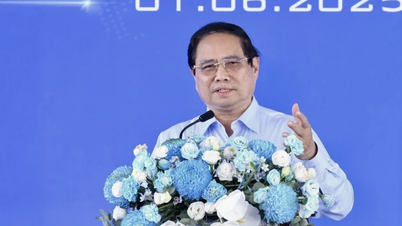Delegate Nguyen Thi Viet Nga said that the current root problem is to review the drug list and to remove the current bottleneck, which is the shortage of drugs and medical supplies.

On the morning of October 24, the National Assembly continued its work program at the 8th Session, listening to the presentation and examination report on the draft Law amending and supplementing a number of articles of the Law on Health Insurance.
Notably, in the Draft amending and supplementing a number of articles of the Law on Health Insurance, it is proposed to remove referral procedures for some rare diseases, serious diseases..., to be transferred directly to high professional levels to reduce procedures, create convenience, reduce out-of-pocket expenses for people, and save costs for the health insurance fund.
The Draft Amendment and Supplement to the Law on Health Insurance has added a payment mechanism for drug transfer to overcome drug shortages and ensure the rights of health insurance participants.
On the sidelines of the National Assembly, delegate Nguyen Thi Viet Nga - Deputy Head of the National Assembly Delegation of Hai Duong province shared about the amendments to the Law amending and supplementing a number of articles of the Law on Health Insurance.
There should be regulations on the list of diseases that are covered by the network.
- Regarding the issue of connecting and transferring routes raised in the draft to amend and supplement a number of articles of the Law on Health Insurance, what is the opinion of delegates on this issue?
Delegate Nguyen Thi Viet Nga: During the process of meeting voters and citizens, I always receive suggestions from citizens and voters on how to carry out the procedures for clearing and transferring routes as quickly as possible for patients. However, to carry out the procedures for clearing and transferring routes, there are several issues that we need to discuss.
Firstly, if there is no longer a regulation on referrals, then people can transfer to higher-level hospitals, which will lead to a very difficult situation in which all higher-level hospitals will be overloaded and lower-level hospitals will have very few patients.
Because according to the common psychology of patients, there is a belief that higher-level hospitals are definitely better than lower-level hospitals. Therefore, patients will go to higher-level hospitals more and the result is very inappropriate for lower-level hospitals, which have very few patients coming for examination.
Second is the process of paying for medical examination and treatment by health insurance when we allocate funds reasonably. Third, if the upper level hospital is overloaded, the lower level hospital has few or no patients, it will lead to a situation where the lower level hospital will find it difficult to develop.

- So, according to you, how can we resolve the situation related to the transfer story in a harmonious and reasonable way?
Delegate Nguyen Thi Viet Nga: In my opinion, this is also a problem we need to solve because there are serious illnesses that require patients to go to higher-level hospitals, but if we carry out all the transfer procedures one by one as we do now, it will take a lot of time for patients and even with some serious illnesses, it will significantly affect the treatment process.
In the draft Law, this amendment states that people have the right to transfer to a higher level of health care when they have certain diseases such as serious diseases, rare diseases, etc. However, to implement this, the Ministry of Health must have very detailed and reasonable regulations on the list of diseases that can be transferred. How can people with these diseases be transferred to a higher level of health care as quickly as possible? I think this regulation is reasonable.
Why are many people still not interested in health insurance?
- Currently, we are aiming for a health insurance coverage rate of over 95% of the population by 2030. However, many people today say that they are not "interested" in health insurance because the initial payment rate is low and the policy is not encouraging. Do you have any suggestions or what changes should the health sector make to attract more people to participate in health insurance?
Delegate Nguyen Thi Viet Nga: Regarding the subjects participating in health insurance, in the draft Law on Health Insurance, many other subjects have been added to comply with the provisions of the law, meeting practical needs. These are divided into many different groups such as: Group of people paying by themselves, group of people partially supported by the state budget, group of people fully paid by the budget... The division into each group has added many subjects.
In my opinion, dividing into groups is reasonable, however, our goal is that by 2030, the health insurance coverage rate will reach over 95% of the population and has now reached over 91%. The target numbers are not far apart, but this gap will be very difficult to achieve if we do not have many measures. Because all those who participate in voluntary health insurance, if they have the need, have already participated. The remaining percentage is the number of cases that are quite difficult to participate. Especially with voluntary health insurance, those who have the need have participated; the majority of the rest do not have the need to participate.
To achieve the target rate of participants, the target for those paid by the state budget will certainly be achieved because participants do not have to pay. The target for those paid for in part is also somewhat easier to achieve. However, the target for those who pay for health insurance themselves still has difficulties, there are fluctuations of those who have participated but do not participate anymore, or only participate for a while and then stop.
In addition, the Ministry of Health needs to immediately resolve the problem of shortage of drugs and medical supplies. According to voters' feedback, there are times when people have health insurance but the hospital lacks drugs, so they have to buy drugs outside and pay for them themselves. Or in cases where the drugs and supplies are not covered by health insurance, people have to pay out of pocket. If people participate in voluntary health insurance, they will not have much faith in health insurance because when they need to be paid, they have to buy the drugs themselves.
Therefore, I think that if we want to expand the number of people participating in voluntary health insurance, we must immediately overcome this situation. In addition, we must balance the level of insurance payment.
Because, according to voters' feedback, many people who buy voluntary health insurance are not interested in health insurance. Because when they need to use health insurance, the payment level, especially at primary health care facilities, is very low. For example, at commune and ward health stations, the current payment level is very low. They think that they have bought health insurance, but when they need to register for primary health care, they are only paid very little.
That is the reason why people are not interested in health insurance. Therefore, the health sector needs to find a way to improve and enhance the quality of medical examination and treatment at primary health care facilities such as commune and ward health stations. In addition, it is necessary to improve the quality of medical examination and treatment and rebalance health insurance payment funds, so that the level of payment for health insurance and primary health examination and treatment is not too low as it is now, then more people will participate.
And there is one thing that I am very concerned about, which is that we calculate the number of people participating in health insurance but there is still a number of people who do not participate in voluntary health insurance - not subject to state budget contributions but they have purchased different life insurance packages and in those life insurance packages there is medical care content, health insurance content. Should we change the way we calculate health insurance participants. For example, people who buy life insurance packages with health insurance content are also counted as health insurance participants. This will greatly increase the rate of people participating in health insurance.
Drug shortage: Need to solve the problem from the root
- Currently, the story about drug refunds for patients who buy drugs outside is brought up in the revised Pharmacy Law, however, many patients are concerned about whether the implementation will be effective or just stop at the level of being put on paper? What is your opinion on this issue?
Delegate Nguyen Thi Viet Nga: Regarding the issue of if the hospital does not have the medicine in the list of health insurance drugs, the patient will be paid. Currently, we have regulations, not that there are no current regulations. The current health insurance law has regulations that in case of lack of medicine and medical supplies, people have to buy them from outside, they will be paid. However, there are two issues that arise: not all types of medicine and medical supplies that people buy will be paid for, but there must be a certain list from the Ministry of Health for what type of disease and what type of medicine will be paid for.
However, the reality is very different and many problems arise. Because many times due to drug shortages, people will not be able to buy the exact type of drug as listed in the hospital's list but will have to buy drugs with equivalent active ingredients instead, and because that equivalent drug is not on the health insurance payment list, the patient will still not be paid by health insurance for that self-purchased drug.
Another problem is that the current procedure for paying for health insurance drugs for patients when buying drugs themselves is too complicated for people, so people accept not paying for the drugs anymore but accept to pay for the drugs themselves.
As for expensive drugs compared to the patient's ability to pay, they will try and struggle to complete all the procedures to get paid. This is a huge barrier that causes the quality of health care under health insurance to decline and not meet the needs of the patient.
Therefore, I also really want when we amend and supplement some articles of the Law on Health Insurance, we need to review the list of drugs that are covered by insurance when people have to buy them outside. But the important thing is that we must fundamentally solve the situation of drug shortages and medical supplies shortages so that people going to the hospital do not have to worry about drug shortages like now.
So the root problem now is that on the one hand we have to review the drug list and on the other hand we have to remove the current bottleneck which is the shortage of drugs and medical supplies. This is very difficult, because many times we have to depend on the drug supply due to the dependence on many external factors. Therefore, the problem is that we have to solve the drug shortage from the root, not just stop at making the drug list more complete and richer.
Thank you very much, delegates! /.
Source: https://www.vietnamplus.vn/lam-sao-de-nguoi-dan-den-benh-vien-khong-phai-nom-nop-lo-thieu-thuoc-post987223.vnp
































































































Comment (0)